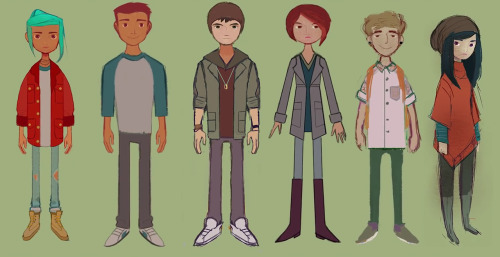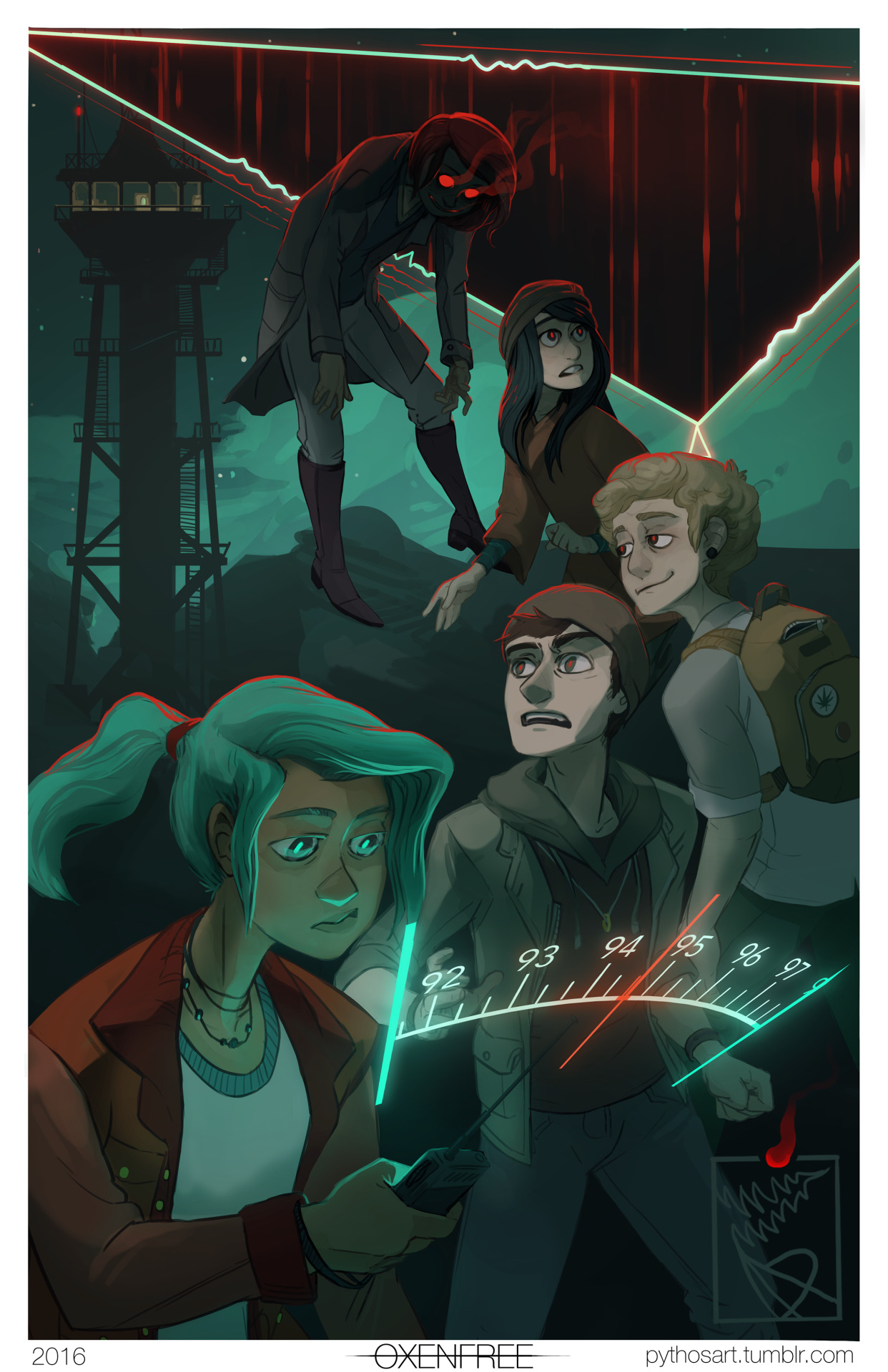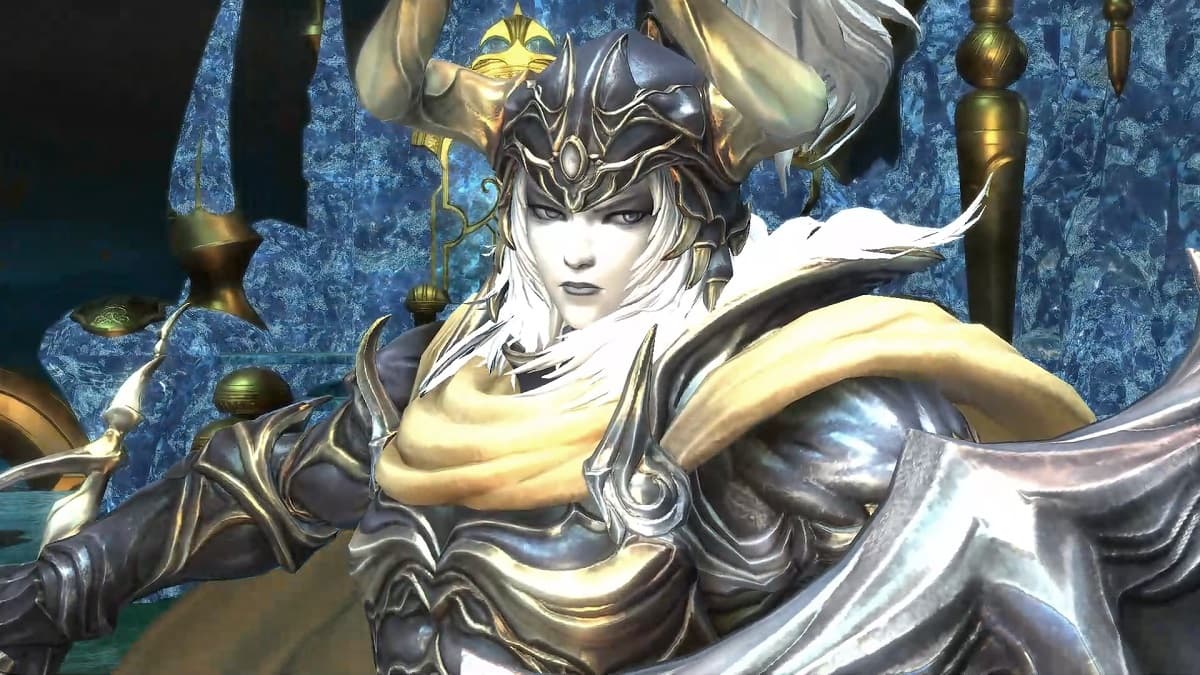Oxenfree is a game that talks not just about ghosts, but also about loss and coping with that loss, which is where we find our group of teenagers. Alex lost her brother, Michael, in a drowning accident. By proxy, Clarissa, the most antagonistic of the teenagers, lost the man that she loved. Both of them are shown to be grieving in different ways, yet end up lashing out at each other. For Clarissa, it’s because part of her blames Alex for the death of Michael. For Alex, it’s because she still resents Clarissa for spending all that time with her big brother, almost “taking him away from her” when he was planning on moving elsewhere with her.

It’s as though both of them have a difficult time accepting Alex’s death as what it was: an accident. Throughout the story, Alex is the one shown to be going through the motions of the grieving process the most, visually speaking, if we are going by the moments where she relives small moments of her life with Michael.
In Roberta Trites’ Novel “Disturbing the Universe: Power and Repression in Adolescent Literature”, she states the following:
“In children’s literature, learning about death symbolizes a degree of separation from one’s parents; adult literature confronts death in a variety of intricate perspectives that it seems difficult to trace a pattern on the topic. But in Adolescent literature, death is often depicted in terms of maturation when the protagonist accepts the permanence of morality, when she/he accepts herself as a being towards death.”
This is also applicable to Oxenfree, because we experience Alex’s slow maturation throughout the story, slowly realizing that there are things she can’t change, even if she tries to. This is shown by the Alexs from other games coming into your save files and trying to tell you what you should and shouldn’t say. Even though Oxenfree runs on multiple diverging points, there are still some instabilities that happen no matter how many times you play, one of which involves Clarissa.
No matter what you do, Clarissa gets possessed by the ghosts and remains their puppet for the remainder of the game, forcing Alex to confront Clarissa in more ways than one. I called Clarissa antagonistic for a reason earlier, because not only is she antagonistic when she isn’t possessed, but she’s also antagonistic when she is, to the point where it’s hard to tell what part is Clarissa and what part is the ghosts. Throughout the game, various members of the group become possessed and you know it’s not them, because from what little you’ve learned about them, they wouldn’t say things like that. With Clarissa on the other hand it’s harder to tell, because she already has a grudge against you and her tone is condescending to say the least.

However, Clarissa isn’t the only one who’s under the ghosts’ control. We come to find that Alex, when she goes into these fugues of past memories, is possessed as well. So, out of all the characters, both of them are the ones that are under control of the angry submarine ghosts the longest. This makes me wonder just why they picked the both of them. For Alex it’s a little more obvious, since she was the one that opened up the rift into the other world into the first place. Clarissa however, well, she was separated from the others but other than that, why did they latch onto her so easily? Why did they choose to use her rather than Ren? If anything, he was the most susceptible to them at the time due to the fact he was high as a kite on those brownies. So why Clarissa?
It’s because of her connection with Alex
The two girls, no matter how you may look at it, have a connection, a single binding thread that binds them together, and that’s Alex’s brother Michael. They are bound together in a duality of grief, and there’s nothing they can do but continue the dance they’re doing until it reaches its most logical conclusion; either resolution or destruction of one of the offending parties.
We can see that Alex is depressed from her dialogue and Clarissa is angry. She’s possibly depressed as well, but it’s harder to tell since she seems pretty frustrated most of the time. Both of them are in stages of grief after all this time, and once Clarissa is possessed it becomes clear that there’s going to be quite a bit more things aired out about Alex’s relationship with her brother and Clarissa as time goes on. Luckily, the player has the ability to make these memories mostly good ones by their choices in the game itself, but still, there’s a more melancholic, negative tint to it than there would have been otherwise.
Grief does that to people
Though it may be best to call the stages of grief “states” of grief, especially according to an editorial found in the British journal of psychiatry by Holly G. Prigerson and Paul K. Maciejewski, called “Grief and acceptance as opposite sides of the same coin: setting a research agenda to study peaceful acceptance of loss”. It states this:
“Yearning was found to be the predominant distressing sentiment throughout the acute bereavement period (i.e. our 1–23 months post-loss observation period). Less frequently experienced reactions such as disbelief, anger and sadness declined on average over time from loss. When each grief indicator was rescaled to enable a comparison of peaks, all peaked within 6 months post-loss and in the exact sequence proposed by Bowlby and Parkes and illustrated by Jacobs. All of these grief indicators were highly correlated with one another, which is understandable given that three of the four grief stage indicators were extracted from an internally consistent grief inventory.
These findings suggest that disbelief, yearning, anger and sadness may represent aspects of a single underlying psychological construct — grief.”
This is a more apt description of what Clarissa and Alex are doing because while they do understand that Michael is dead, neither of them seemed to have fully accepted it yet. Or at least the reason why he was dead, other than blaming one another. This anger they feel towards each other manages to set the more dramatic parts of the story in motion, since Alex — who may want to save Clarissa depending on how you play her — still hasn’t fully forgiven Clarissa (or herself for that matter) for the death of Michael.

The ghosts themselves seem to represent not only the deceased men and women from the submarine, but all of the underlying, chaotic emotions that are buried in Clarissa and Alex’s psyches. For those of you who are familiar with the paranormal, you may know about the concept of how certain places that are haunted “awaken” when certain kinds of people enter, because it reignites the energy of the place. Clarissa is filled with all of the anger these ghosts can possibly need, and Alex has just as much anger below the surface.
There’s also depression, melancholy… all of these raw emotions that the ghosts tell Alex they’re feeling or have felt throughout the game. While they’re antagonistic to Alex, they’re also playful, trying to get her to play games with them for the lives of those she loves. This initially made me wonder if they were just corrupted and made sadistic by their own time lost in this strange triangle-like void; or if they sensed a kindred spirit in her, knowing that she has felt what they felt and they’re ultimately using that against her.
They are grief in its rawest, most visceral form, unyielding and unbridled. Everything raw that was ever screamed out in anguish, any tears shed, any solemn silences held: that’s what they are, or at least that’s what they’ve become after all these years of not moving on. They use those who are in the most pain as puppets for their own gain so they may eventually pass into our world, by taking some other bereaved souls with them, Alex and her friends being near-perfect targets for them.
But what about Jonas, you may ask?
Jonas also gets possessed a fair amount, mourns his mother’s death, and is now bound to Alex as a kindred spirit and a Stepbrother. Why didn’t they also use him as a puppet more often than they did? That’s because they weren’t connected by the same sort of event, and because Alex giving up Jonas is quite a bit different than Alex giving up Clarissa.

The ghosts used Clarissa because they knew Alex, in her grief, would be more willing to give up the body, mind and soul of someone she had grown to dislike out of grief than someone she had sort of grown attached to and didn’t mind. It was the perfect plan, and even if they didn’t get all of the kids, they still got one body for one spirit to live out the remainder of their days.
Keep in mind though; a lot of this negativity is from Alex’s point of view. Don’t get me wrong, Clarissa is quite a negative Nancy about things, but she’s also quick witted, smart and funny. During the flashbacks we see from her, we see that’s she’s also quite caring as well, which strongly contrasts her at the very beginning of the story.
It sets Alex up to be more of an unreliable narrator, since all of the conversations we had with Clarissa, prior to the one we see in the memory, now need to be looked at through this frame. Clarissa was actually a snarky, yet caring, fun-loving person who was more than willing to let Alex come along during times that should have been dates between her and Michael. She was willing to indulge the love Michael had for his little sister and was willing to talk to Alex to try to get to know her better.
When you then look back to her conversations with Alex at the very beginning of the story, you notice that there are little moments where she tries to insist to Alex that she doesn’t hate her, and that she’s actually a good friend — judging by what her friend Nona tells Alex about her birthday memory of her from all those years ago. With her still angry however, this blinds her to how her behavior affects others and how it negatively influenced our heroine, to the point where there was an option to actually turn against Clarissa and kill her. But there’s also a lot more to it; we do find that Alex herself has changed since the death of her brother, and this has been noted by the characters themselves.
For Reference, The American School Counselor Association published an article about “How Teenagers Cope with Sibling Death: Some Implications for School Counselors” written by David Balk in which he states:
“While admitting that sibling death does not necessarily lead to pathological consequences, few persons would be so bold as to dismiss the threat to well-being posed by sibling death. In one study that supported the findings of Cain et al. (1964), previously well-adjusted children typically manifested “altered behavior patterns that indicated considerable difficulty in coping after a sibling had died.”
Alex still wasn’t coping well with the fact that Michael had died, which is seen in her stilted conversation about it with Jonas, her discomfort when Clarissa brings it up, and her reactions when confronted with the visions of her friends stating that it was her fault that he died. Reading further into the study, it’s noted that some of the relationships with peers improved, some of them became worse and some of them were unchanged.
“Twenty one said their relationships with peers changed after the death; 10 worse relationships and 4 mixed relationships. Better relationships were attributed primarily with sharing with someone else during a time of need. Many peers however, were portrayed as uncertain and uncomfortable around the participants. Over time, relationships that had gone bad improved and those that had deepened endured.”
Which speaks volumes of both Alex and Clarissa’s relationship, because they did have a falling out after Michael’s death consisting of not speaking to each other and lashing out at one another. However, you have the option to improve their relationship if you choose to not sacrifice Clarissa near the end of the game, as well as if you’re overall friendly with her in the memories flashbacks and trying to help her when she’s under that possession — according to the epilogues, doing so improves their relationship dramatically.

Image Credit: pythosart.tumblr.com
This is part of the duality of their grief; both of them feel this strong sense of loss that is ultimately starting to come to a head, to the point where it’s going to explode, in one way or another. The ghosts themselves, were also creatures filled with anger, resentment, and grief because of the accident — which is part of the reason why they started attempting to take other’s lives in the first place. When the girls arrived at the island, their own emotions mirrored that of the ghosts, and it made it a lot easier for the them to reawaken. It wasn’t just the radio that reawakened them; it was these locked away feelings, buried deep below the surface of our two main power players throughout the story. Clarissa is the only character that’s unable to resist the ghost’s possession, or else she reached that moment of acceptance right as it possessed her.
You’ll note that unlike the other characters, where there are moments where the characters say “snap out of it,” we never see any glimpses of Clarissa desperately clawing back to the surface in order to get control again. Which means that the ghosts overwhelmed her with her own feelings of guilt, and she accepted her place as their puppet, or that she willingly allowed them to possess her in order to get some sort of revenge on Alex. Meanwhile, Alex has the option to accept that her brother is gone as well as her own feelings of guilt; or get ultimate revenge on Clarissa by dooming her body and mind to the depths of elsewhere by allowing her to be possessed by the ghosts.
Despite being drastically different characters, Clarissa and Alex go through very similar traumas, which result in near identical emotional states. It’s just the way they handle that emotion is different, causing a variety of conflicts between them. By summoning the ghosts, Alex allowed all those emotions to get out into the open, and finally confronted Clarissa in the way that she needed to in order to come to some form of resolution. Whether or not that lead to her death is ultimately up to you.
Do you have any thoughts on Oxenfree? What do you think about the duality of grief between these two characters? Tell us in the comments below!









Published: Nov 4, 2016 08:20 am